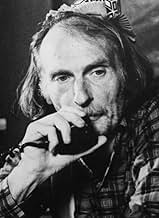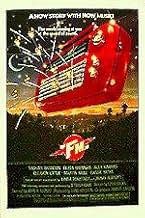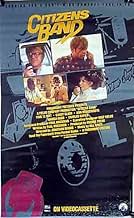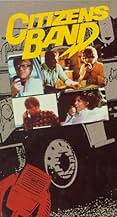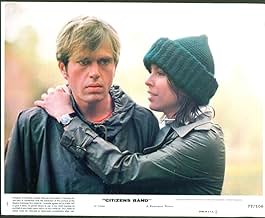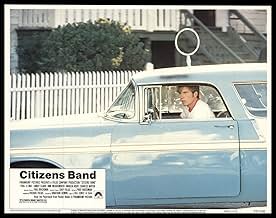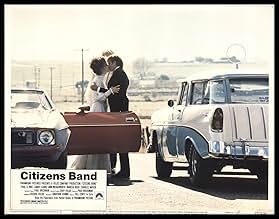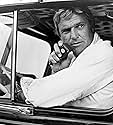The interlaced stories of several characters in a small town united by their use of CB (citizen's band) radio.The interlaced stories of several characters in a small town united by their use of CB (citizen's band) radio.The interlaced stories of several characters in a small town united by their use of CB (citizen's band) radio.
- Awards
- 1 win & 1 nomination total
- Director
- Writer
- All cast & crew
- Production, box office & more at IMDbPro
6.4981
1
2
3
4
5
6
7
8
9
10
Featured reviews
gentle and fluid
Speaking of whimsy (I just saw Life Aquatic), here's another ensemble piece, this one centered on an array of Southern jes' folks who live out their fantasy lives via CB radio. From bigamist trucker to alcoholic dad to humorous Nazi to overbearing but good-hearted gym teacher to every individual we glimpse in between, everyone is acutely and humanely drawn, and the action moves forward in an organic, relaxed way that is extremely endearing. Only at the end, when the whole ensemble converges to witness the dad's happy redemption, do things feel badly contrived; up to then the gentleness and fluidity of Demme's and writer Paul Brickman's conception carry us along smiling.
One of the best of the 70s CB movies, probably THE best!
This movie was made in the 1970s (3 years after American Graffiti) when use of the Citizens Band radio was at it's all time high. Hollywood, not being one to let a good craze go untapped when they can make good money from it, did EXACTLY that with this movie. Starring Paul Le Mat and Candy Clark, both of American Graffiti fame, it chronicles the lives of some CB radio fanatics living in a rural town who have nothing better to do than "Be someone else" on the radio.
Paul Le Mat (Spider)plays a CB regulator of sorts, a REACT station operator, who goes on a crusade to clean up the airwaves. he tries to accomplish this by cruising around in his very cool 1956 Chevy Nomad Stationwagon CB equipped of course! He peruses The Hustler, a 10yo self proclaimed ladies man for using ch9, the emergency channel. He also goes after Grandma Breaker, a non stop talker for keeping the channel all locked up 24-7. He goes after The Rad Baron, a Nazi wannabe who hates everything and everyone NON white. He goes up against The Priest, played very well by Ed Beagly Jr, who turns in a very believable performance for preaching the gospel on the radio without a license. He only breaks off his pursuit of these folks when he and his buddy almost get shot by the Red baron who catches them in his yard.
One must take this movie for face value in that it is a relatively simple movie but the actors and direction is perfect for portraying the lifestyle of rural CBers in the America of the times.
One of the greatest lines in the movie, spoken my Paul (Spider) is "No one in this town is who they are supposed to be!" He is referring to the fact that people on the radio are sometimes far different in real life, an alter ego of sorts, compared to reality. His girlfriend Candy Clark plays Elektra, a sexy talking lady on the radio who talks dirty to other CBers (like Warlock) in an attempt to rid herself of the small town blues. Then there is Chrome Angel, who gets stuck in town after a trucking accident after Paul (Spider) saves his life because of his REACT station. Chrome Angel is a bigamist who's two wives come to meet him unknown to each other till they meet on the bus. Paul's Father, Papa Thermodyne, is an ex trucker who seems to listen to only what comes over the CB so much so that Spider has to use a CB in another room to talk to him. It is only when Papa Thermodyne gets fed up and leaves home suitcase in hand, attempting to walk to Canada and everyone has to band together to find him that everyone gets along.
The movie has a good pace as well, never getting boring especially if you were also a CB junkie in the 60s~the 80s. Great acting, great script, great characters. Definitely a worthwhile watch! I highly recommend it and since it is available instantly you know where, it is a great watch. I wish it was available on DVD as I would buy it.
Paul Le Mat (Spider)plays a CB regulator of sorts, a REACT station operator, who goes on a crusade to clean up the airwaves. he tries to accomplish this by cruising around in his very cool 1956 Chevy Nomad Stationwagon CB equipped of course! He peruses The Hustler, a 10yo self proclaimed ladies man for using ch9, the emergency channel. He also goes after Grandma Breaker, a non stop talker for keeping the channel all locked up 24-7. He goes after The Rad Baron, a Nazi wannabe who hates everything and everyone NON white. He goes up against The Priest, played very well by Ed Beagly Jr, who turns in a very believable performance for preaching the gospel on the radio without a license. He only breaks off his pursuit of these folks when he and his buddy almost get shot by the Red baron who catches them in his yard.
One must take this movie for face value in that it is a relatively simple movie but the actors and direction is perfect for portraying the lifestyle of rural CBers in the America of the times.
One of the greatest lines in the movie, spoken my Paul (Spider) is "No one in this town is who they are supposed to be!" He is referring to the fact that people on the radio are sometimes far different in real life, an alter ego of sorts, compared to reality. His girlfriend Candy Clark plays Elektra, a sexy talking lady on the radio who talks dirty to other CBers (like Warlock) in an attempt to rid herself of the small town blues. Then there is Chrome Angel, who gets stuck in town after a trucking accident after Paul (Spider) saves his life because of his REACT station. Chrome Angel is a bigamist who's two wives come to meet him unknown to each other till they meet on the bus. Paul's Father, Papa Thermodyne, is an ex trucker who seems to listen to only what comes over the CB so much so that Spider has to use a CB in another room to talk to him. It is only when Papa Thermodyne gets fed up and leaves home suitcase in hand, attempting to walk to Canada and everyone has to band together to find him that everyone gets along.
The movie has a good pace as well, never getting boring especially if you were also a CB junkie in the 60s~the 80s. Great acting, great script, great characters. Definitely a worthwhile watch! I highly recommend it and since it is available instantly you know where, it is a great watch. I wish it was available on DVD as I would buy it.
This movie brings back memories.
I still enjoy this movie even though some parts are slow and seem to drag on a bit. I really wish they would release it to Blu-Ray or DVD, I have a VHS copy but would prefer a DVD or Blu-ray copy. I did see it on Netflix a few months ago. When I watch this movie it brings back memories. I live in a very small town where there isn't much to do, back in the late 80's and 90's the only thing that interested me was getting on Citizens Band radio. I would always look forward to the weekends so I could get on my base station at home or get in my truck and drive around and talk for hours and hours. My friends and I would do the dumbest things on the radio like dead keying on channel 19 just to irritate everyone. We would use linear amplifiers with our base stations and mobile radios so it would be near impossible for anyone in the area to be heard. We did so many stupid things on the radio back then that it would take far too long to list everything. We would also track people down by using the signal strength meter on the mobile radio to find out where people were broadcasting from so we could get their home address if they were on a base station or find out what type of vehicle they were driving and write down their license plate number and make and model of their vehicle. Now days citizen band radio isn't very popular. I always wanted to see an updated version of this movie but I know it wouldn't be very popular now days. I guess the closest thing would be the movie Joy Ride (2001).
An Inconsistent Story - Or Stories
Another example of a movie featuring independent stories that find a connecting point, "Handle With Care" (or "Citizens Band") puts its own twist on the genre by having the stories connect through the use of CB radios by the main characters.
As with almost any movie of this type, some of the stories are better than others. The story featuring "Spider" (Paul Le Mat) as a sort of CB super-hero who makes sure that people don't abuse the airwaves was a bit silly, and reminded me a lot of the old '70's TV series "Emergency," combined with a bit of "Batman" - without the costume. Like the paramedics of "Emergency" kept responding to largely unrelated emergencies with at best only a loose thread holding every episode together, Spider similarly dealt with an injured trucker (Charles Napier) and a pilot forced to crashland on a highway, and - like the Caped Crusader without the cape - he took on a boy who used the radio for underhanded purposes, a neo-Nazi who spread hatred and a radical Catholic priest who was trying to convert listeners. The best story was of that rescued trucker, who turns out to be a bigamist and who has to deal with both wives coming to see if he's OK. That story was also responsible for most of the humour in the movie, and was, I thought quite well done. Spider's dysfunctional family, and the sexual CB fantasies of "Warlock" and "Electra" were other connecting stories.
It was an inconsistent movie - some stories were very good and very funny, some were quite dull to be honest. It's worth no more than a 5, but in fairness it's a 5 that's worth watching.
As with almost any movie of this type, some of the stories are better than others. The story featuring "Spider" (Paul Le Mat) as a sort of CB super-hero who makes sure that people don't abuse the airwaves was a bit silly, and reminded me a lot of the old '70's TV series "Emergency," combined with a bit of "Batman" - without the costume. Like the paramedics of "Emergency" kept responding to largely unrelated emergencies with at best only a loose thread holding every episode together, Spider similarly dealt with an injured trucker (Charles Napier) and a pilot forced to crashland on a highway, and - like the Caped Crusader without the cape - he took on a boy who used the radio for underhanded purposes, a neo-Nazi who spread hatred and a radical Catholic priest who was trying to convert listeners. The best story was of that rescued trucker, who turns out to be a bigamist and who has to deal with both wives coming to see if he's OK. That story was also responsible for most of the humour in the movie, and was, I thought quite well done. Spider's dysfunctional family, and the sexual CB fantasies of "Warlock" and "Electra" were other connecting stories.
It was an inconsistent movie - some stories were very good and very funny, some were quite dull to be honest. It's worth no more than a 5, but in fairness it's a 5 that's worth watching.
A Ticklish Little Trial Run for Its Director
This here is a forgotten little movie about a small town that communicates less than amicably via CB radio. I don't say that it's a forgotten little gem, like it would've been expected of me to say after 'forgotten little' because it's not really a gem. That's not to say it doesn't attempt some interesting things, and occasionally succeeds. At the center of the story, I think, is a young guy who repairs said radios and volunteers with a monitoring organization and acts as a sort of community FCC, busting everyone's balls on the somewhat taboo things they talk to each other about on this sort of walkie-talkie sort of system. Everyone's anonymous, it's very rare that this stickler of a guy can deduce who is who when he hears them and objects, and what it makes me think of as a young guy myself, watching it on a library VHS in the year 2010, is an earlier, unofficial form of social networking that is ubiquitous nowdays. MySpace, Facebook. REACT International is like a poor Mormon in a room full of rich atheists now.
Citizens Band is interesting because it was made in 1977 and I'm watching it now. Other than that, it's decent, but nothing really pops out at me. I stand by my claim of an uncanny parallel between the abuse of a citizens-band radio and the online networks of the information age. Look at what these characters do! Calling themselves by monikers on the airwaves such as Chrome Angel, Dallas Angel, Papa Thermodyne, Hot Coffee. Isn't that what we did for years on MySpace before we got sick of it and gravitated toward Facebook and started using our real names? At its core though, Citizens Band, or Handle With Care, as it is known in a further edited version, is a B comedy about an assortment of deadpan screwballs. That's not bad at all. Don't get me wrong. It feels like an Altman film in ensemble, in situations, in the depiction of a fully realized world of people, and certain plot strands are kind of novel and fun for that reason, such as when two women meet on their way to the same town, and find out they have more than a lot in common. Demme never looks down on his working class characters, displaying instead a compassion and empathy. Even a polygamist trucker, our young protagonist who in this day and age would probably be written off as a McCarthy or Murdoch sort of oppressor, and even his controlling, competitive older brother.
Having seen Demme's later work, from the 1980s and his obvious crowning achievements later on, I suppose I expected more of his love of music as well, and there is very little. But who am I to criticize a filmmaker at the start of his career, making B films and exploitation films, trying to get started, feeling out his strong suits and his weak ones? The reasons why an above-par director could've made a sub-par film is often because he has yet to discover the sources of his passions, the key to his craftsmanship. Citizens Band is one of those sub-par films by one of those above-par directors. And don't miss Bruce McGill in his first film. That's right, pre-D Day!
Citizens Band is interesting because it was made in 1977 and I'm watching it now. Other than that, it's decent, but nothing really pops out at me. I stand by my claim of an uncanny parallel between the abuse of a citizens-band radio and the online networks of the information age. Look at what these characters do! Calling themselves by monikers on the airwaves such as Chrome Angel, Dallas Angel, Papa Thermodyne, Hot Coffee. Isn't that what we did for years on MySpace before we got sick of it and gravitated toward Facebook and started using our real names? At its core though, Citizens Band, or Handle With Care, as it is known in a further edited version, is a B comedy about an assortment of deadpan screwballs. That's not bad at all. Don't get me wrong. It feels like an Altman film in ensemble, in situations, in the depiction of a fully realized world of people, and certain plot strands are kind of novel and fun for that reason, such as when two women meet on their way to the same town, and find out they have more than a lot in common. Demme never looks down on his working class characters, displaying instead a compassion and empathy. Even a polygamist trucker, our young protagonist who in this day and age would probably be written off as a McCarthy or Murdoch sort of oppressor, and even his controlling, competitive older brother.
Having seen Demme's later work, from the 1980s and his obvious crowning achievements later on, I suppose I expected more of his love of music as well, and there is very little. But who am I to criticize a filmmaker at the start of his career, making B films and exploitation films, trying to get started, feeling out his strong suits and his weak ones? The reasons why an above-par director could've made a sub-par film is often because he has yet to discover the sources of his passions, the key to his craftsmanship. Citizens Band is one of those sub-par films by one of those above-par directors. And don't miss Bruce McGill in his first film. That's right, pre-D Day!
Did you know
- TriviaBruce McGill's first movie.
- GoofsPlanes do not operate on the same frequencies as CB radio, neither do they carry regular CB aboard as the frequencies used interfere with the navigation equipment.
- How long is Citizens Band?Powered by Alexa
Details
- Release date
- Country of origin
- Language
- Also known as
- Handle with Care
- Production companies
- See more company credits at IMDbPro
Box office
- Gross US & Canada
- $815,530
- Gross worldwide
- $815,530
Contribute to this page
Suggest an edit or add missing content

